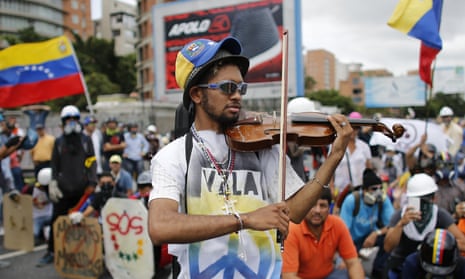Venezuela’s opposition have announced a two-day national strike against President Nicolas Maduro following a day of violent clashes in Caracas on Saturday where the injured included a violinist who has become the face of the protests.
“Neither rubber bullets nor pellets will stop our fight for Venezuela’s independence,” said musician Wuilly Arteaga. The 23-year-old has become famous in Venezuela for playing the national anthem and other tunes on his violin in front of security lines as battles rage around him. “Tomorrow I will be back in the streets.”
The opposition Democratic Coalition – which organised a 24-hour shutdown this week that was heeded by millions and paralysed large swaths of the South American nation – said the next strike would be on Wednesday and Thursday.
Mass marches have been planned for Monday and Friday in an effort to force Maduro into aborting a controversial a vote on 30 July to elect a constituent assembly charged with rewriting the constitution.
(Video) Ni PERDIGONES NI METRAS nos detendrán de seguir luchando hasta lograr la INDEPENDENCIA DE VENEZUELA. Mañana vuelvo a las CALLES... pic.twitter.com/aZHnmv7Hgt
— WuillyMoisésArteaga (@WuillyArteaga) July 22, 2017
Video provided by Robert Carmona-Borjas
Opposition and human rights groups say the move is aimed at bypassing the National Assembly, which has been under opposition control since 2016, further consolidating the ruling Socialist party’s grip on power. Maduro argues a new constitution would promote dialogue in a country deeply polarised and crippled by widespread shortages of food, medicine and basic services, and unbridled violent crime.
On Saturday, several thousand protesters sought to march on the pro-Maduro supreme court in support of alternative magistrates appointed by the opposition on Friday. Security forces blocked them with armored cars and riot shields. Clashes ensued for several hours as hundreds of masked youths hurled stones and Molotov cocktails at National Guard troops firing tear gas from motorcycles.
The injured included Arteaga, who was treated by paramedics in the street as blood poured down his face. He later tweeted a video from hospital with a bandaged face, still clutching his violin.
More than 100 people have died and thousands more have been injured in anti-government unrest since demonstrations began in April.
Opposition lawmaker Simon Calzadilla said at a news conference flanked by other coalition officials: “The Venezuelan people are not giving up, they are valiant, they will come out to defend democracy and the constitution.”
Foes accuse Maduro of turning Venezuela into a dictatorship and wrecking what should be a prosperous economy. They want free elections and an end to two decades of socialist rule.
Maduro calls himself a flag bearer for the international left, up against right-wing “terrorists” seeking a coup with the connivance of the US and the international media.
The opposition is stepping up street tactics in what it dubs “zero hour” for Venezuela to try to block the new Constitutional Assembly Maduro wants to set up.
The opposition is boycotting the vote, calling it a sham and demanding conventional elections instead.
The Constituent Assembly, whose election rules appear designed to guarantee a majority for the government even though it has minority popular support, could rewrite the constitution and disband the existing opposition-led legislature.

At rival pro-government rallies on Saturday, candidates for the Constituent Assembly said it was the only way to bring peace to Venezuela. “We are not going to let them destroy our fatherland,” said Delcy Rodriguez, who left her post as foreign minister to stand for the new congress.
“All of us united are going to tell the right wing ‘We’ve had enough of terrorism’,” Maduro’s wife Cilia Flores, also running for an assembly post, told the same rally in Caracas.
Also on Saturday, the government’s intelligence service arrested Angel Zerpa, one of 13 sworn in as supreme court magistrates by the opposition in defiance of the government, opposition leaders said.
Authorities have threatened to arrest all the opposition-named judges and try them in military courts.
International pressure has been growing on Maduro to abandon next weekend’s vote, including a threat from US President Donald Trump to apply economic sanctions.
But the government is showing no sign of backing down, announcing that it will put 232,000 soldiers on the streets to ensure the Constituent Assembly goes ahead.
On Saturday, National Guard forces could be seen firing tear gas canisters horizontally at demonstrators in contravention of international norms, witnesses said. “The repression has been brutal and the world has to understand what we are living through in the streets of Venezuela,” opposition leader María Corina Machado said. “It’s criminal.”
Reuters contributed to this report
